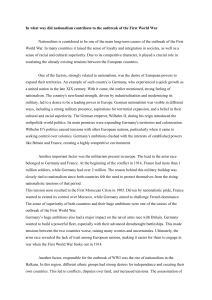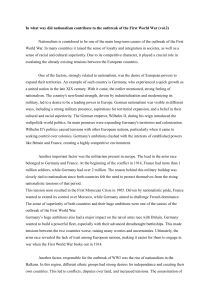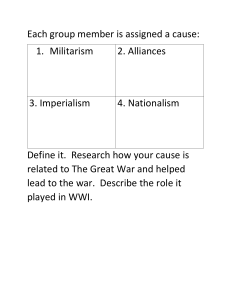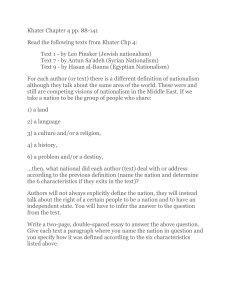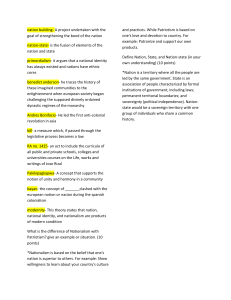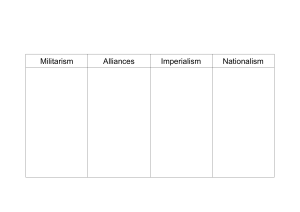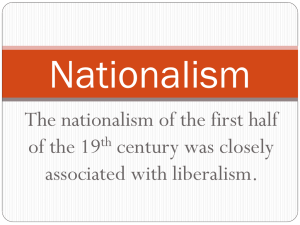In what way did nationalism contribute to the outbreak of the WWI
advertisement
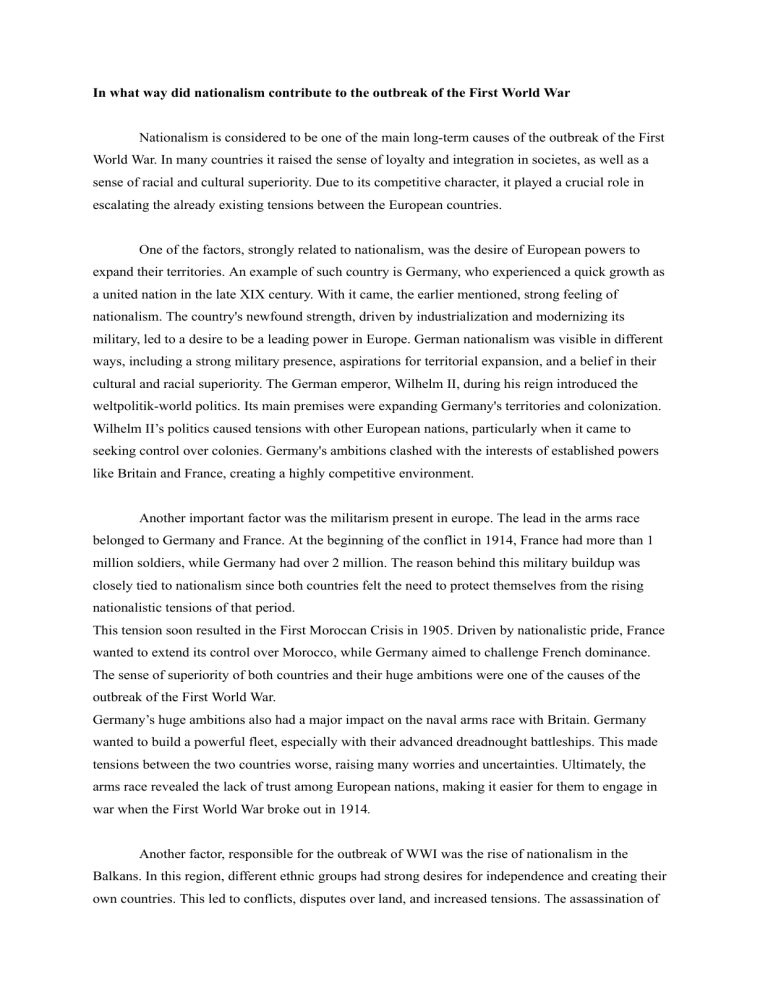
In what way did nationalism contribute to the outbreak of the First World War Nationalism is considered to be one of the main long-term causes of the outbreak of the First World War. In many countries it raised the sense of loyalty and integration in societes, as well as a sense of racial and cultural superiority. Due to its competitive character, it played a crucial role in escalating the already existing tensions between the European countries. One of the factors, strongly related to nationalism, was the desire of European powers to expand their territories. An example of such country is Germany, who experienced a quick growth as a united nation in the late XIX century. With it came, the earlier mentioned, strong feeling of nationalism. The country's newfound strength, driven by industrialization and modernizing its military, led to a desire to be a leading power in Europe. German nationalism was visible in different ways, including a strong military presence, aspirations for territorial expansion, and a belief in their cultural and racial superiority. The German emperor, Wilhelm II, during his reign introduced the weltpolitik-world politics. Its main premises were expanding Germany's territories and colonization. Wilhelm II’s politics caused tensions with other European nations, particularly when it came to seeking control over colonies. Germany's ambitions clashed with the interests of established powers like Britain and France, creating a highly competitive environment. Another important factor was the militarism present in europe. The lead in the arms race belonged to Germany and France. At the beginning of the conflict in 1914, France had more than 1 million soldiers, while Germany had over 2 million. The reason behind this military buildup was closely tied to nationalism since both countries felt the need to protect themselves from the rising nationalistic tensions of that period. This tension soon resulted in the First Moroccan Crisis in 1905. Driven by nationalistic pride, France wanted to extend its control over Morocco, while Germany aimed to challenge French dominance. The sense of superiority of both countries and their huge ambitions were one of the causes of the outbreak of the First World War. Germany’s huge ambitions also had a major impact on the naval arms race with Britain. Germany wanted to build a powerful fleet, especially with their advanced dreadnought battleships. This made tensions between the two countries worse, raising many worries and uncertainties. Ultimately, the arms race revealed the lack of trust among European nations, making it easier for them to engage in war when the First World War broke out in 1914. Another factor, responsible for the outbreak of WWI was the rise of nationalism in the Balkans. In this region, different ethnic groups had strong desires for independence and creating their own countries. This led to conflicts, disputes over land, and increased tensions. The assassination of Archduke Franz Ferdinand of Austria-Hungary by a Serbian nationalist in 1914 was the final trigger to the conflict and is still considered to be the main short-term cause of the outbreak of WWI. Austria-Hungary's response pulled other countries into the conflict, resulting in even more intense rivalry and, in the end, outbreak of the First World War. One of the less obvious factors was the russian nationalism during and after the Russo-Japanese war. Russia's loss to Japan in 1905 shattered its image as a great power and caused trouble within the country. To regain their pride and shift attention away from domestic problems, Russia turned its focus towards the Balkans, in order to influence this region. This move raised concerns among other European countries and contributed to the outbreak of the First World War. In conclusion, nationalism played a significant role in the outbreak of World War I, as it resulted in a strong sense of loyalty, integration, and a belief in the superiority of a country's own race and culture. The competitiveness led to an escalation of existing tensions between the European countries and fueled territorial ambitions .Germany, with its rapid growth as a united nation, driven by industrialization and a powerful military, strived to expand its influence and establish dominance. The naval arms race between Germany and Britain further escalated tensions. Additionally, the rise of nationalism in the Balkans intensified rivalries and led to the assassination of Archduke Franz Ferdinand, causing the outbreak of the First World War. The Russian response to their defeat in the Russo-Japanese War also contributed to the rapid growth of tensions in Europe. All these factors, rooted in nationalism, led to the devastating global conflict of World War I. sources: podręcznik Poznać przeszłość 3 https://www.historycrunch.com/nationalism-as-a-cause-of-world-war-i.html#/ https://alphahistory.com/worldwar1/nationalism/#Sources_of_nationalism http://www.viaevrasia.com/documents/The%20Russian%20Nationalists%20and%20the%20First%20World%20War.%20Svetoslav %20Manoilov.pdf https://alphahistory.com/worldwar1/russia/#The_Russo-Japanese_War https://www.history.com/this-day-in-history/the-first-moroccan-crisis
